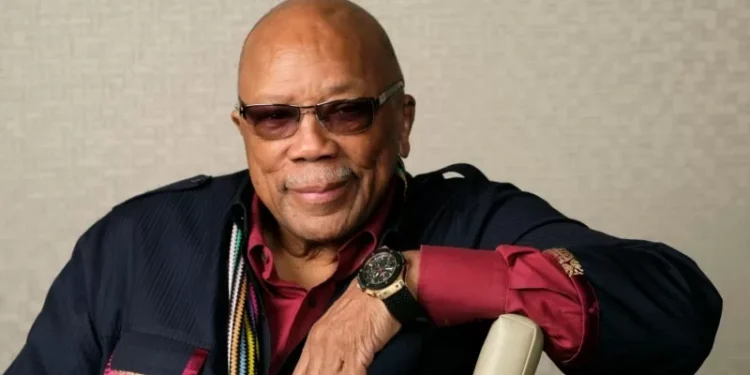Legendary music producer and composer Quincy Jones has passed away at the age of 91, leaving behind an unparalleled legacy in the world of music and entertainment. Jones, whose career spanned over seven decades, was known for his collaborations with music icons like Michael Jackson, Frank Sinatra, and Ray Charles, as well as for his award-winning film and television scores. His family announced his passing on Sunday night, stating that he died at his home in the Bel Air section of Los Angeles, surrounded by his loved ones.
Jones’ journey to success was nothing short of remarkable. Growing up on the South Side of Chicago, he faced numerous challenges, including running with gangs. But his passion for music and his determination led him to become one of the first Black executives to thrive in Hollywood. He also amassed an extraordinary musical catalog, making him a household name and a leader in the entertainment industry.
Throughout his career, Jones rubbed shoulders with presidents, foreign leaders, movie stars, musicians, philanthropists, and business leaders. He toured with jazz legends Count Basie and Lionel Hampton, arranged records for the likes of Sinatra and Ella Fitzgerald, and composed the soundtracks for iconic productions like “Roots” and “In the Heat of the Night.” His talents were also called upon to organize President Bill Clinton’s first inaugural celebration and oversee the recording of “We Are the World,” the 1985 charity record for famine relief in Africa.
Jones’ collaborations with Michael Jackson are perhaps some of the most memorable moments in music history. The albums “Off the Wall,” “Thriller,” and “Bad” were groundbreaking in their style and appeal, and his partnership with Jackson showcased their versatility and imagination. Hits like “Billie Jean” and “Don’t Stop ‘Til You Get Enough” fused elements of disco, funk, rock, pop, R&B, and jazz with African chants, captivating listeners around the world. The iconic album “Thriller” sold over 20 million copies in 1983 alone and has remained one of the best-selling albums of all time.
In an interview with the Library of Congress in 2016, Jones emphasized the crucial role of a producer in the success of an album. He stated, “If an album doesn’t do well, everyone says ‘it was the producer’s fault,’ so if it does well, it should be your ‘fault’ too.” Jones’ skill, experience, and ability to guide the vision to completion were evident in his numerous accolades and achievements. He received 27 Grammys (now 28), an honorary Academy Award (now two), and an Emmy for his work on “Roots.” He was also honored with prestigious awards like France’s Legion d’Honneur and the Rudolph Valentino Award from the Republic of Italy. In 1990, a documentary titled “Listen Up: The Lives of Quincy Jones” was made about his life and career, and in 2018, his daughter Rashida Jones released a film on his life. His autobiography, “Q,” became a best-seller, cementing his status as a music legend.
Jones’ passing is a significant loss for the music industry, but his contributions to American culture will never be forgotten. His influence and impact will continue to inspire generations to come, and his timeless music will live on. As Lionel Richie, who co-wrote “We Are the World,” once said, Jones was the “master orchestrator” of music, and his legacy will continue to resonate for years to come. Tonight, we celebrate the great life that Quincy Jones lived, and we thank him for his immense contributions to the world of music and beyond. Rest in peace, Quincy Jones.








